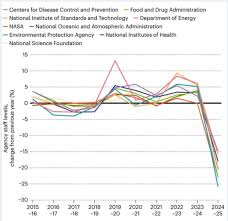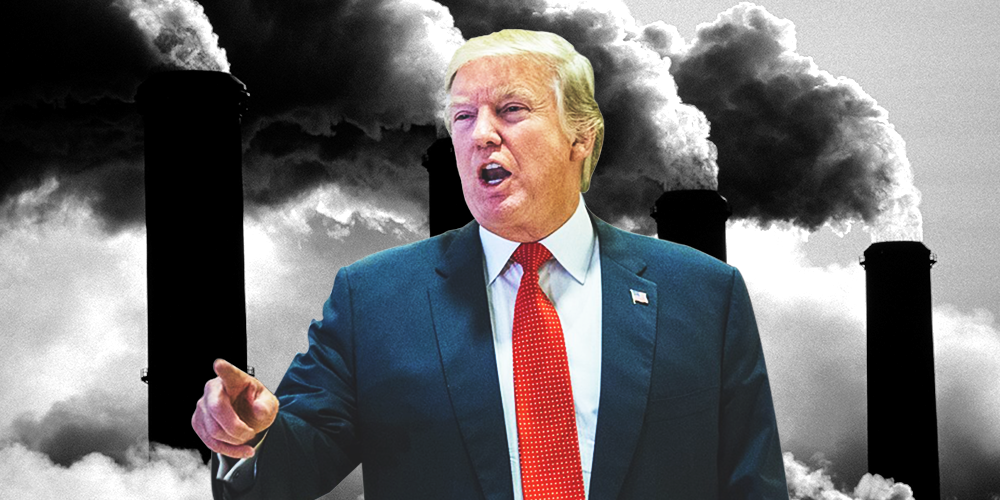Federal Climate Policy
Want to Fight for Science? Look to South Dakota. No, Really.
We need a permanent grassroots strategy for science before we are buried in Idiocracy.
Nature this week offers a series of terrifying, interactive graphs detailing the Trump Administration’s Idiocratic War on Science. Not only has it butchered federal scientific research grants, but as you can see in this graphic, it has hollowed out the federal scientific workforce – the dedicated professionals who develop data to allow for science-informed policy …
Continue reading “Want to Fight for Science? Look to South Dakota. No, Really.”
CONTINUE READINGOne Year of Energy Emergencies
The Drain is a weekly roundup of environmental and climate news from Legal Planet.
This past Tuesday — on the one-year anniversary of Donald Trump taking office and immediately declaring a national energy emergency — the new governor of New Jersey took office and immediately declared a state energy emergency. But these two approaches to executive action on energy couldn’t be more different and the results will help define …
Continue reading “One Year of Energy Emergencies”
CONTINUE READINGAlejandro Camacho Joins UCLA Law Faculty
Camacho will be a core faculty member of the UCLA Emmett Institute and a contributor to Legal Planet.
At this critical moment in environmental law, the Emmett Institute at UCLA School of Law keeps growing stronger. We are pleased to welcome Alejandro Camacho, a renowned regulatory scholar, as a professor of law. Camacho will be a core faculty member of the Emmett Institute on Climate Change and the Environment and a faculty affiliate of …
Continue reading “Alejandro Camacho Joins UCLA Law Faculty”
CONTINUE READINGNightmare on Penn Ave (Part 2)
After a year of Trump 2.0, here’s how things stand.
Eight years ago almost to the day, I wrote a post titled, “One Year and Counting.” I was writing at the end of Trump’s first year in office. And here we are again, one year into a second Trump Administration. Trump’s basically deregulatory strategy has remained largely unchanged. But there are some notable differences in the situations then and now. I closed my 2017 post with this: “One characteristic of the Trump Administration is a ceaseless stream of controversies and dramas. But generally speaking, the amount of actual legal change has been much more limited, because the system is designed to provide checks on administrative and legislative action.” It remains to be seen how well those checks will function this time around.
CONTINUE READINGWait — WHAT??
Science funding has been spared the worst cuts for now, but don’t believe the hype — and know that the White House has more tricks up its sleeve.
The topline headlines look great: CNN: Trump wants to slash funding for federal climate and weather research. Congress is about to tell him ‘No’ Reuters: US Senate passes bill to boost federal science spending after White House sought major cuts NBC: Congress passes bill to fund U.S. science agencies, rebuffing Trump’s requested cuts And there …
Continue reading “Wait — WHAT??”
CONTINUE READINGThe U.S. Has Now Become a Rogue Nation
By pulling out of the UNFCCC and dozens of international organizations, Trump has isolated the United States and ceded influence to China and the EU.
In the past few days, Trump has kidnapped the head of state of Venezuela, threatened to invade Greenland, and withdrawn from a 1992 climate treaty negotiated by George H.W. Bush. The treaty, the U.N. Framework Convention on Climate Change, has been the basis for international climate cooperation for the past thirty years, including the Paris Agreement. In addition, Trump is withdrawing from the Intergovernmental Panel on Climate Change (IPCC), which will make it harder for American scientists to contribute to the periodic reports on the state of climate science. Trump’s action is basically a big middle finger toward the rest of the world. If anyone wins from this, it’s China, which can now claim to be the responsible adult in the room.
CONTINUE READING2026: The Year Ahead
Here are six big things to watch.
What to watch for environmentally in 2026: court tests of Trump’s power, midterms, China, grid issues, and state energy moves. In 2025, Trump rolled out new initiatives at a dizzying rate. That story, in one form or another, dominated the news. This year, much of the news will again be about Trump, but he will have less control of the narrative. Legal and political responses to Trump will play a greater role, as will economic developments. Trump’s anti-environmental crusade could run into strong headwinds.
CONTINUE READINGThat Was the Year That Was
2025 had a lot of bad environmental news, but also a few rays of hope.
2025 has been a dark time for Americanswho care about the environment. Rather than being a repeat of his first term, which had been bad enough environmentally, Trump’s second term has been a tsunami of bad news. Besides some outright rollbacks, Trump has done his best to purge the government of programs and people implementing environmental law. Much of that has been illegal but effective anyway. The demolition of the East Wing will be remembered as a defining moment, the perfect metaphor for an Administration that has religiously embraced the motto, “move fast and break things.”
CONTINUE READINGGames Deregulators Play
Here are the six moves the Trump EPA consistently uses to justify deregulation.
If you start reading the Trump Administration’s arguments for deregulation, a repetitive feeling soon sets in. Every deregulation is different, of course, but there are stock arguments that seem to surface again and again.These arguments have a distortion effect, blurring the benefits of regulations while magnifying their costs.
CONTINUE READINGThe CAFE Rollback Is Audaciously, Aggressively Awful
The proposal even rolls back standards that the first Trump Administration set.
This morning I blogged about some wonky reactions to the Trump/NHTSA rollback of the CAFE standards. Now I want to step back and highlight just how truly bad the new set of standards is, based on incredibly aggressive legal interpretations. As my first post highlights, the standards are set for ten years despite statutory language …
Continue reading “The CAFE Rollback Is Audaciously, Aggressively Awful”
CONTINUE READING













